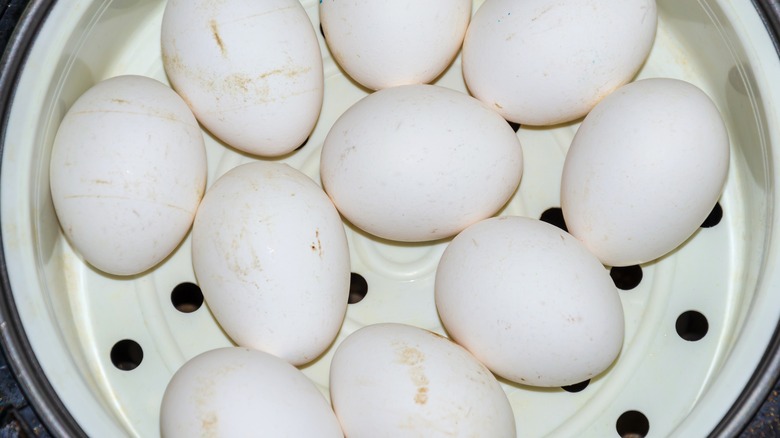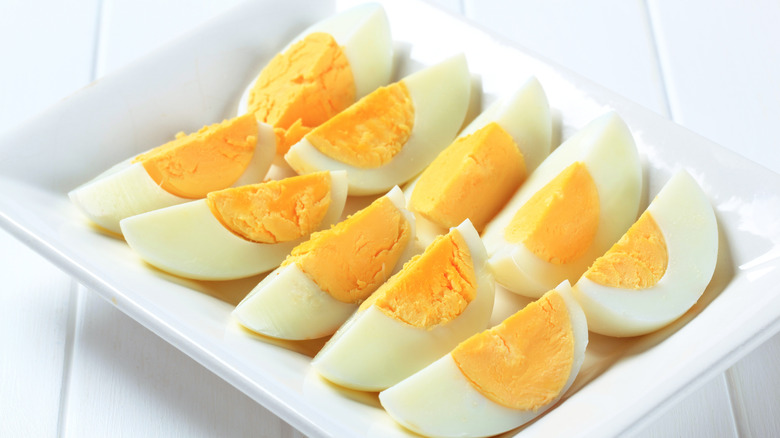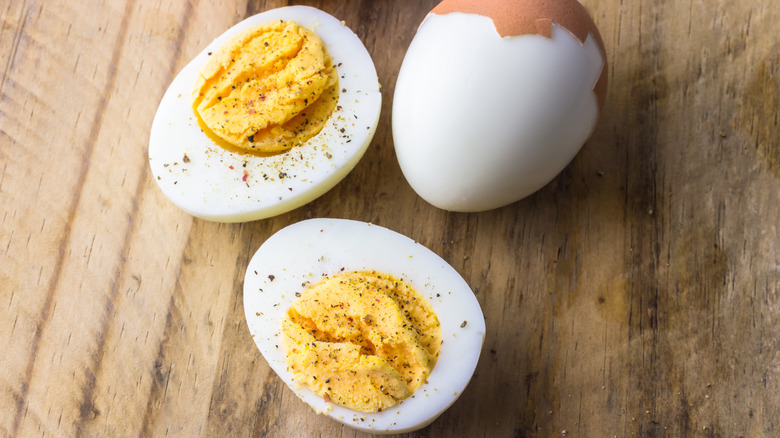The Case For Steaming Your Hard-Boiled Eggs Every Single Time
Hard-boiled eggs are one of those foods everyone does a little bit differently. It's a process rife with quick and easy hacks and tips that promise the best hard-boiled eggs ever, ones with perfectly tender whites and non-chalky yolks that peel easily and don't have the dreaded green ring. The suggestions are endless: Drop eggs in already boiling water, plunge them into an ice bath afterward, and be sure to add a bit of white vinegar to the water while cooking to easily detach the shell in one piece. But the case for steaming your hard-boiled eggs every single time may outweigh all the advice you've heard before.
Steaming your hard-boiled eggs is a simple and easy way to ensure they come out perfectly cooked. It takes the same amount of time (or could even be a bit faster) and yields a more tender egg overall. When it comes to ease of peeling, steamed hard-boiled eggs peel equally as well as hard-boiled eggs cooked in boiling water.
And steaming couldn't be easier to do. Bring an inch of water to a boil in a big pot with a steamer basket inside. Once the water is boiling, place your eggs in the steamer, cover, and cook for 12 minutes. Once time is up, quickly spoon each egg into an ice water bath to cool. Wait about 15 minutes before peeling and enjoy fully intact and hard-boiled eggs.
Why it works
Proving something works is all about repetition and replicating results, and chef and food journalist J. Kenji López-Alt did just that to test out all the methods of preparing hard-boiled eggs to identify the best way. Does a cold-water start result in eggs that are more easily peeled? Does cooking the eggs in a muffin tin in the oven lead to rubbery whites? He shared his trials and experiments with The New York Times, finally landing on steaming as the best technique for preparation.
López-Alt borrowed from the scientific method to test out all the supposed tricks, record his results, and analyze the data. Taste-wise, eggs that are steamed turn out more tender than boiled eggs because the indirect heat from the steam is more gentle than boiling water. It's also just as fast or faster to steam your eggs because you only need to bring one inch of water to a boil versus an entire pot.
Other hard-boiled egg tips to file away
There's often some debate over whether fresh eggs or older eggs are better for hard-boiling. Turns out, it depends on what you're using them for. If aesthetics matter and visual presentation is important to you — perhaps for the creamiest deviled eggs — then you might want to go with fresher eggs. The air pocket inside the eggshell grows with time, which means older eggs can turn out a bit misshapen when hard-boiled and peeled. They're also more likely to develop the dreaded green ring around the yolk, thanks to the alkalinity of the egg white. If the presentation doesn't matter, then either fresh or older eggs work; they taste the same.
Another tip involves using a push pin to achieve a perfectly hard-boiled egg. Backed by famed chef Jacques Pépin, the trick advises piercing a tiny hole into the base of the egg at the wider end. This allows the gas that builds up there to escape during the boiling process, ensuring your egg doesn't crack the shell as it expands and cooks.


